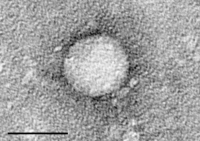
Dynamic expression of H19 and MALAT1 and their correlation with tumor progression biomarkers in a multistage hepatocarcinogenesis model
Sign Up to like & getrecommendations! Published in 2023 at "Cell Biochemistry and Function"
DOI: 10.1002/cbf.3785
Abstract: Hepatocellular carcinoma (HCC) progresses sequentially in a stepwise pattern. Long noncoding RNA (lncRNA) can regulate the complex cascade of hepatocarcinogenesis. Our study aimed to elucidate the expression profile of H19 and MALAT1 during the different… read more here.
Keywords: tumor progression; h19 malat1; hepatocarcinogenesis; expression ... See more keywords

Farnesoid X receptor ablation sensitizes mice to hepatitis b virus X protein–induced hepatocarcinogenesis
Sign Up to like & getrecommendations! Published in 2017 at "Hepatology"
DOI: 10.1002/hep.28924
Abstract: Chronic hepatitis B virus infection is a major risk factor for hepatocellular carcinoma (HCC). Hepatitis B virus X protein (HBx) is a hepatitis B virus protein that has multiple cellular functions, but its role in… read more here.
Keywords: hepatology; hepatitis virus; hepatocarcinogenesis; hbx ... See more keywords

Suppression of Noncoding RNAs as Shared Early Genetic Events in Multistep Hepatocarcinogenesis.
Sign Up to like & getrecommendations! Published in 2021 at "Hepatology"
DOI: 10.1002/hep.32077
Abstract: Common genetic traits are not well defined for hepatocellular carcinoma (HCC) because long-lasting necroinflammation facilitates various genetic errors in hepatocytes prior to hepatocarcinogenesis. read more here.
Keywords: early genetic; rnas shared; suppression noncoding; noncoding rnas ... See more keywords

Amino acid substitutions in the hepatitis C virus core region predict hepatocarcinogenesis following eradication of HCV RNA by all‐oral direct‐acting antiviral regimens
Sign Up to like & getrecommendations! Published in 2018 at "Journal of Medical Virology"
DOI: 10.1002/jmv.25047
Abstract: Impact of substitution of aa70 in the core region (Core aa70) in HCV genotype 1b (HCV‐1b) on hepatocarcinogenesis following eradication of HCV RNA by direct‐acting antiviral therapy is not clear. In a retrospective study, 533… read more here.
Keywords: hcv rna; direct acting; acting antiviral; hepatocarcinogenesis ... See more keywords

Inhibition of lysophosphatidic acid receptor 6 upregulated by the choline‐deficient l‐amino acid‐defined diet prevents hepatocarcinogenesis in mice
Sign Up to like & getrecommendations! Published in 2023 at "Molecular Carcinogenesis"
DOI: 10.1002/mc.23516
Abstract: Hepatocellular carcinoma (HCC) is one of the most worrying tumors worldwide today, and its epidemiology is on the rise. Traditional pharmacological approaches have shown unfavorable results and exhibited many side effects. Hence, there is a… read more here.
Keywords: lysophosphatidic acid; hepatocarcinogenesis; acid; deficient amino ... See more keywords

Haematological protective effect of raw extract and nano-Eclipta alba–treated rats in experimentally induced hepatocarcinogenesis
Sign Up to like & getrecommendations! Published in 2020 at "Comparative Clinical Pathology"
DOI: 10.1007/s00580-020-03092-1
Abstract: The objective of the present study was to evaluate the effect of Eclipta alba (L.) and E. alba nanoparticles on haematological and hepatoprotective parameters in diethyl nitrosamine (DEN)–induced toxicity and hepatocarcinogenesis model in rats. Eighty-one… read more here.
Keywords: eclipta alba; alba; group; effect ... See more keywords

Sympathetic nervous system promotes hepatocarcinogenesis by modulating inflammation through activation of alpha1-adrenergic receptors of Kupffer cells
Sign Up to like & getrecommendations! Published in 2017 at "Brain, Behavior, and Immunity"
DOI: 10.1016/j.bbi.2016.08.016
Abstract: The sympathetic nervous system (SNS) is known to play a significant role in tumor initiation and metastasis. Hepatocellular carcinoma (HCC) frequently occurs in cirrhotic livers after chronic inflammation, and the SNS is hyperactive in advanced… read more here.
Keywords: sympathetic nervous; nervous system; inflammation; promotes hepatocarcinogenesis ... See more keywords

Commiphora molmol resin attenuates diethylnitrosamine/phenobarbital-induced hepatocarcinogenesis by modulating oxidative stress, inflammation, angiogenesis and Nrf2/ARE/HO-1 signaling.
Sign Up to like & getrecommendations! Published in 2017 at "Chemico-biological interactions"
DOI: 10.1016/j.cbi.2017.04.012
Abstract: The objective of the current study was to investigate the possible chemopreventive activity of Commiphora molmol resin (myrrh) extract using a rat model of diethylnitrosamine (DEN)/phenobarbital (PB)-induced early stage hepatocarcinogenesis. Here, we pointed to the… read more here.
Keywords: resin; angiogenesis; molmol resin; hepatocarcinogenesis ... See more keywords

Hesperidin protects against chemically induced hepatocarcinogenesis via modulation of Nrf2/ARE/HO-1, PPARγ and TGF-β1/Smad3 signaling, and amelioration of oxidative stress and inflammation.
Sign Up to like & getrecommendations! Published in 2017 at "Chemico-biological interactions"
DOI: 10.1016/j.cbi.2017.09.015
Abstract: Hesperidin is a plant-derived bioflavonoid with promising antitumor efficacy, though the underlying mechanisms of action remain poorly elucidated. Thus, we evaluated the in vivo chemopreventive effect of hesperidin against diethylnitrosamine (DEN)-induced hepatocarcinogenesis. We demonstrated the modulatory… read more here.
Keywords: smad3; smad3 signaling; hesperidin; nrf2 ppar ... See more keywords

Mito‐TEMPO, a mitochondria‐targeted antioxidant, prevents N‐nitrosodiethylamine‐induced hepatocarcinogenesis in mice
Sign Up to like & getrecommendations! Published in 2019 at "Free Radical Biology and Medicine"
DOI: 10.1016/j.freeradbiomed.2019.03.037
Abstract: Background: Oxidative stress and mitochondrial dysfunction play a significant role in hepatocarcinogenesis. Mitochondria are source organelle as well as target for free radicals. The oxidative damage to mitochondria can be prevented by mitochondria‐targeted antioxidant, mito‐TEMPO.… read more here.
Keywords: mitochondria targeted; mito tempo; hepatocarcinogenesis; targeted antioxidant ... See more keywords

Yap-Sox9 signaling determines hepatocyte plasticity and lineage-specific hepatocarcinogenesis.
Sign Up to like & getrecommendations! Published in 2021 at "Journal of hepatology"
DOI: 10.1016/j.jhep.2021.11.010
Abstract: BACKGROUND & AIMS Primary liver tumors contain distinct subtypes. A subset of iCCAs can arise from cell fate reprogramming of mature hepatocytes in mouse models. However, the underpinning of cell fate plasticity during hepatocarcinogenesis is… read more here.
Keywords: hepatocarcinogenesis; plasticity; sox9; yap activation ... See more keywords